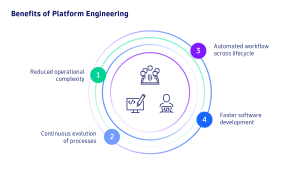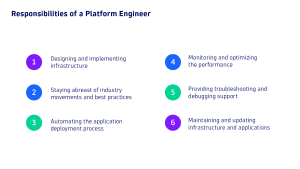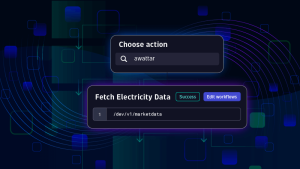Platform engineering enables development teams to deliver a frictionless, self-service developer experience with minimum overhead. Learn the importance of platform engineers and more.
With growing multicloud complexity and the need for organization-wide scalability, self-service and automation capabilities have become increasingly essential for developer productivity.
In response to this shift, platform engineering is rapidly growing in popularity. Many consider it an effective solution for improving efficiency and overall satisfaction for developers across a variety of organizations and industries.
The practice of platform engineering has evolved alongside the increasing complexity of cloud environments. Platform engineering is a practice that outlines how development teams build internal developer platforms (IPDs) to create self-service capabilities for software engineering teams. The result is a cloud-native approach to software delivery. A platform encompasses a set of tools, services, and infrastructure that enables developers to build, test, and deploy software applications. Platform engineers design and implement these platforms, as well as ensure their security, scalability, and reliability.
In what follows, we’ll cover the importance of platform engineering, the role of a platform engineer, and where the practice is heading in the future.

How does platform engineering work?
Platform engineering works by addressing common developer issues and streamlining software delivery to expedite the development processes. Self-service capabilities reduce complexity and allow developers to freely use the platform’s provided tools, workflows, services, and automation. As a result, developers can focus on the end product of the development process rather than its logistics and underlying infrastructure.
While self-service capabilities promote flexibility, platforms still help maintain compliance and synergy across development processes through centralized and predefined frameworks. Platforms provide a “paved road” for development teams, minimizing common obstacles and catering to needs to empower developers to easily navigate software delivery.
Platforms are an excellent way to scale development processes across an organization. As such, they’re typically most suitable for larger organizations but can also have their utility in smaller organizations. Maintaining coherence and compliance across multiple developers and teams may require a great deal of time and effort, especially without the aid of centralized infrastructure, toolchains, and templates. Fortunately, appropriately designed platforms provide these aids.

Why is platform engineering important?
With platform engineering, a development team can deliver a frictionless, self-service developer experience and provide maximum value with minimum overhead. Some of the primary advantages that the discipline provides include the following:
Accelerated software development
Platform engineering offers resources that foster efficiency, such as reusable components. These components are specific, predefined resources, such as libraries and templates, that are made available to all developers using the platform. Other aspects of the discipline — such as infrastructure as code, automation, and standardization — reduce extraneous manual processes to increase developer productivity.
Increased security
Secure coding practices are built into internal developer platforms (IDPs) from their inception. These practices include working with secrets and key management, vulnerability management and remediation, penetration testing, and OWASP. Platform engineering can automate many of these functions, making it easier to maintain a strong organizational security posture.
Reduced operational complexity
The self-service portals inherent to platform engineering greatly simplify operational processes. With these portals, developers do not need to rely on or coordinate with other teams that may not have the bandwidth to properly assist them. In turn, this reduced complexity fosters greater developer satisfaction and leads to less employee burnout.
Consistency in development processes
Platform-engineered, self-service portals involve standardized practices, which help to maintain consistency throughout the entire software delivery process. Centralized development practices, security protocols, and operational procedures make this consistency possible. In turn, consistency reduces errors, mean time to resolution, and silos, resulting in improved software quality and performance overall.
Scaling capabilities
Platform engineering offers scalability through its standardization and consistency. As a digital ecosystem expands, development teams must keep up with its evolution. The flexible and scalable nature of IDPs allows developers to seamlessly adapt and respond to these infrastructure changes.
“Platform engineering is increasingly becoming the focal point for organizations seeking to advance the maturity of their DevOps automation practices,” says Anita Schreiner, vice president of delivery at Dynatrace, in the 2023 DevOps Automation Pulse report. “This shift is accompanied by a rise in technical debt and coordination efforts among teams. Without a central and integrated platform, scaling automation to drive further impact becomes an insurmountable challenge.”
In response to these increasing demands, the report found that a staggering 54% of organizations are investing in platforms to enable easier integration of tools and collaboration between teams involved in automation projects.
Internal developer platforms
Internal developer platforms (IDPs) are the “platform” in platform engineering. Developers use IDPs to efficiently deliver software at scale. Most commonly, platforms consist of tools, templates, libraries, services, and other resources that developers can leverage to accelerate and streamline software delivery.
IDPs can also provide automated workflows that assist with repeatable tasks and boost developer productivity. Additionally, platform teams can bake security and compliance measures into IDPs. Through their centralized use, IDPs help ensure development processes are consistent and do not introduce vulnerabilities.
Platform teams are essentially product teams: their product is the IDP and their customers are internal developers. By treating the IDP as a product, platform teams are incentivized to create the best user experience possible, with the ultimate goal of achieving the highest user satisfaction. Platform teams thus strive to fine-tune all of the IDP’s components to best suit the developers using them.
Because needs vary greatly from organization to organization, there is no singular correct formula to create an effective IDP. IDPs may look and operate very differently across organizations. Ultimately, an effective IDP is specifically tailored to the developers using it, ensuring a frictionless delivery process and the utmost user satisfaction.
DevOps and the platform engineer role
In the world of DevOps, the role of platform engineers is relatively new. To better comprehend this role’s function, one must first understand how the discipline of platform engineering relates to DevOps as a whole.
DevOps methodology encourages collaboration between development and operations teams. To aid this collaboration, platform engineering offers DevOps teams a centralized platform for their tools and workflows. To some extent, the two practices complement each other. Like DevOps, successful platform engineering requires collaboration between development, security, and operations teams.
But beyond simply fostering collaboration, a central purpose of platform engineering is to support DevOps teams with tools, platforms, and workflows for effective software development. This realization has led to an increased organizational use of microservices to shift away from traditional product teams in favor of teams that apply platform engineering principles.
Platform engineering cannot stand alone, however. DevOps teams are still required because each application may require a unique DevOps pipeline. To attend to this need, platform teams provide the centralized infrastructure and tooling so DevOps teams may build their own pipelines independent of other teams.

The future of platform engineering
Platform engineering is at an evolutionary point as it matures alongside other DevOps practices. Overall, the future of the discipline entails working with product managers, designing based on internal development team requirements, and simplifying the DevOps process.
Platform engineers will see their purpose as creating infrastructure (as a product) to better understand the software delivery cycle’s requirements. Their metric of success will relate to how easily developers can self-service their requirements and own their code in production.
Learn more about platform engineering in this eBook!”
Platform engineering FAQs
What is the purpose of platform engineering?
Platform engineering is the creation and maintenance of internal developer platforms (IDPs) that offer self-service capabilities. Its core purpose is to provide software engineering teams with streamlined tools and workflows. This frees developers to focus on writing code and building features.
What benefits do internal developer platforms (IDPs) offer to development teams?
IDPs reduce operational complexity and cognitive load by providing self-service access to standardized tools, services, and infrastructure. IDPs also ensure consistency, enforce security protocols, and accelerate software delivery while maintaining compliance across an organization.
When is an organization ready to implement platform engineering?
Organizations should consider implementing platform engineering and Internal Developer Platforms (IDPs) once their development teams grow beyond approximately 20-30 developers. At this scale, managing consistency, compliance, and infrastructure across multiple teams becomes increasingly complex without centralized aid. Before you implement a platform engineering program, it helps to assess existing infrastructure and finalize your budget.
What are the key roles within a platform engineering team?
- The Head of Platform Engineering is responsible for strategic oversight and resource allocation
- The Platform Product Manager defines the platform’s roadmap based on user feedback
- DevEx platform engineers focus on optimizing the developer experience
- Infrastructure platform engineers ensure the underlying infrastructure is robust and compliant




Looking for answers?
Start a new discussion or ask for help in our Q&A forum.
Go to forum